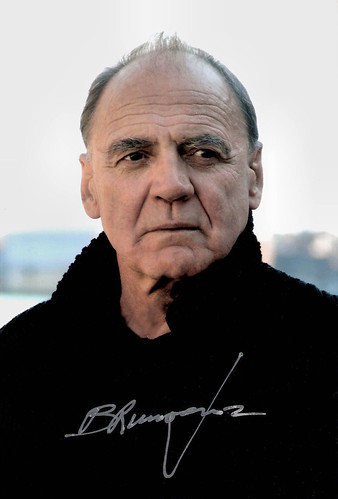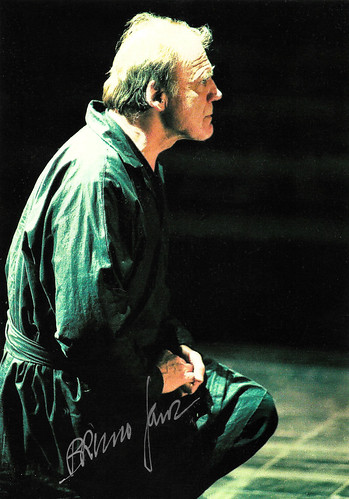On 15 February 2019, Swiss actor Bruno Ganz passed away. Ganz established himself in Germany, first as co-founder of the Schaubuhne Theatre company, then as a romantic lead in films. International renown came Ganz's way when he starred in Eric Rohmer's The Marquise of O (1976). Subsequent film roles ranged from Jonathan Harker in Werner Herzog's Nosferatu/Nosferatu: Phantom of the Night (1979) with Klaus Kinski and Isabelle Adjani, to misplaced angel Damiel in Wim Wenders' Der Himmel über Berlin/Wings of Desire (1987). He also starred in international features by Franklin J. Schaffner, Jonathan Demme and Francis Ford Coppola, and he played Adolf Hitler in the Academy Award-nominated film Der Untergang/Downfall (2004). Bruno Ganz was 77.

German autograph card.
Bruno Ganz was born in 1941 in Zürich-Seebach, Switzerland. His parents were a Swiss mechanic father and a northern Italian mother.
Bruno had decided to pursue an acting career by the time he entered university. His film debut was Der Herr mit der schwarzen Melone/The Gentleman in the Black Derby (Karl Suter, 1960), which was not a success. He debuted at the theatre in 1961 and gained a reputation as a reflexive, charismatic and technically brilliant stage actor. In 1970 he founded with Peter Stein the theatre company 'Schaubühne' in Berlin.
In cinema, Ganz slowly became one of the best-known and most acclaimed actors in the German language. He collaborated with many of the most respected European directors of his time, most notably Eric Rohmer, Werner Herzog and especially Wim Wenders.
Probably his most memorable collaboration with Wenders was Der Amerikanische Freund/The American Friend (Wim Wenders, 1977), an adaptation of Patricia Highsmith's novel 'Ripley's Game'. Ganz regarded it as one of his favourite films, even though he and co-star Dennis Hopper came to blows during a spirited argument about acting technique.
His performance as the angel Damiel in Der Himmel über Berlin/Wings of Desire (Wim Wenders, 1987) became so iconic, that he could make a short and silent appearance as the same character in Börn náttúrunnar (Friðrik Þór Friðriksson, 1991) without confusing the audience. Later, he would reprise the role in the sequel In weiter Ferne, so nah!/Faraway, So Close (Wim Wenders, 1993).

German autograph card. Photo: Ruth Walz.
Bruno Ganz acted in three features nominated for the 'Best Foreign Language Film' Academy Award: Börn náttúrunnar/Children of Nature (Friðrik Þór Friðriksson, 1991), Der Untergang/Downfall (Oliver Hirschbiegel, 2004) and Der Baader Meinhof Komplex/The Baader Meinhof Complex (Uli Edel, 2008) with Martina Gedeck and Moritz Bleibtreu. He also appeared in a feature nominated for 'Best Picture': The Reader (Stephen Daldry, 2008) with Kate Winslet and Ralph Fiennes.
Der Untergang/Downfall (Oliver Hirschbiegel, 2004) told the story of Hitler's final days in his Berlin bunker. It grossed $92m at box offices around the world when it was released. On stage, Ganz portrayed Dr. Heinrich Faust in Peter Stein's 11-hour staging of 'Faust, Part One' and 'Faust, Part Two' in 2000. His great performance was also filmed for TV in Johann Wolfgang von Goethe: Faust I (Peter Schönhofer, 2001) and Johann Wolfgang von Goethe: Faust II (Thomas Grimm, 2001).
Among his more recent films were Unknown (Jaume Collet-Serra, 2011) with Liam Neeson, The Counselor (Ridley Scott, 2013) with Michael Fassbinder, and he played a pseudo-scientific healer in Sally Potter's The Party (2017). One of his last roles was in Lars von Trier's psychological Horror art film The House that Jack Built (2018) on a serial killer, played by Matt Dillon.
At the time of his death, Bruno Ganz was the holder of the Republic of Austria's Iffland-Ring, a 200-year-old accolade to the German-speaking actor judged 'most significant and worthy'. In 1996, Ganz inherited it from his colleague Josef Meinrad. The ring is passed from person to person, and it is not yet clear who Ganz had intended it to transfer to on the occasion of his death.
On 15 February 2019, Bruno Ganz died of colon cancer in his hometown Zürich, Switzerland. He was married to Sabine Ganz and the couple had one son, Daniel (1972). They lived separately, and Ganz's longtime companion was the photographer Ruth Walz.
Trailer Der Amerikanische Freund/The American Friend (1977). Source: Dionysus Cinema (YouTube).
Trailer Der Untergang/Downfall (2004). Source: pagontradLT (YouTube).
Trailer The House that Jack Built (2018). Source: IFC Films (YouTube).
Sources: Hal Erickson (AllMovie), Volker Böhm (IMDb), BBC News, Wikipedia and IMDb.
This post was last updated on 1 May 2024.

German autograph card.
A spirited argument with Dennis Hopper about acting technique
Bruno Ganz was born in 1941 in Zürich-Seebach, Switzerland. His parents were a Swiss mechanic father and a northern Italian mother.
Bruno had decided to pursue an acting career by the time he entered university. His film debut was Der Herr mit der schwarzen Melone/The Gentleman in the Black Derby (Karl Suter, 1960), which was not a success. He debuted at the theatre in 1961 and gained a reputation as a reflexive, charismatic and technically brilliant stage actor. In 1970 he founded with Peter Stein the theatre company 'Schaubühne' in Berlin.
In cinema, Ganz slowly became one of the best-known and most acclaimed actors in the German language. He collaborated with many of the most respected European directors of his time, most notably Eric Rohmer, Werner Herzog and especially Wim Wenders.
Probably his most memorable collaboration with Wenders was Der Amerikanische Freund/The American Friend (Wim Wenders, 1977), an adaptation of Patricia Highsmith's novel 'Ripley's Game'. Ganz regarded it as one of his favourite films, even though he and co-star Dennis Hopper came to blows during a spirited argument about acting technique.
His performance as the angel Damiel in Der Himmel über Berlin/Wings of Desire (Wim Wenders, 1987) became so iconic, that he could make a short and silent appearance as the same character in Börn náttúrunnar (Friðrik Þór Friðriksson, 1991) without confusing the audience. Later, he would reprise the role in the sequel In weiter Ferne, so nah!/Faraway, So Close (Wim Wenders, 1993).

German autograph card. Photo: Ruth Walz.
The German-speaking actor judged 'most significant and worthy'
Bruno Ganz acted in three features nominated for the 'Best Foreign Language Film' Academy Award: Börn náttúrunnar/Children of Nature (Friðrik Þór Friðriksson, 1991), Der Untergang/Downfall (Oliver Hirschbiegel, 2004) and Der Baader Meinhof Komplex/The Baader Meinhof Complex (Uli Edel, 2008) with Martina Gedeck and Moritz Bleibtreu. He also appeared in a feature nominated for 'Best Picture': The Reader (Stephen Daldry, 2008) with Kate Winslet and Ralph Fiennes.
Der Untergang/Downfall (Oliver Hirschbiegel, 2004) told the story of Hitler's final days in his Berlin bunker. It grossed $92m at box offices around the world when it was released. On stage, Ganz portrayed Dr. Heinrich Faust in Peter Stein's 11-hour staging of 'Faust, Part One' and 'Faust, Part Two' in 2000. His great performance was also filmed for TV in Johann Wolfgang von Goethe: Faust I (Peter Schönhofer, 2001) and Johann Wolfgang von Goethe: Faust II (Thomas Grimm, 2001).
Among his more recent films were Unknown (Jaume Collet-Serra, 2011) with Liam Neeson, The Counselor (Ridley Scott, 2013) with Michael Fassbinder, and he played a pseudo-scientific healer in Sally Potter's The Party (2017). One of his last roles was in Lars von Trier's psychological Horror art film The House that Jack Built (2018) on a serial killer, played by Matt Dillon.
At the time of his death, Bruno Ganz was the holder of the Republic of Austria's Iffland-Ring, a 200-year-old accolade to the German-speaking actor judged 'most significant and worthy'. In 1996, Ganz inherited it from his colleague Josef Meinrad. The ring is passed from person to person, and it is not yet clear who Ganz had intended it to transfer to on the occasion of his death.
On 15 February 2019, Bruno Ganz died of colon cancer in his hometown Zürich, Switzerland. He was married to Sabine Ganz and the couple had one son, Daniel (1972). They lived separately, and Ganz's longtime companion was the photographer Ruth Walz.
Trailer Der Amerikanische Freund/The American Friend (1977). Source: Dionysus Cinema (YouTube).
Trailer Der Untergang/Downfall (2004). Source: pagontradLT (YouTube).
Trailer The House that Jack Built (2018). Source: IFC Films (YouTube).
Sources: Hal Erickson (AllMovie), Volker Böhm (IMDb), BBC News, Wikipedia and IMDb.
This post was last updated on 1 May 2024.
No comments:
Post a Comment